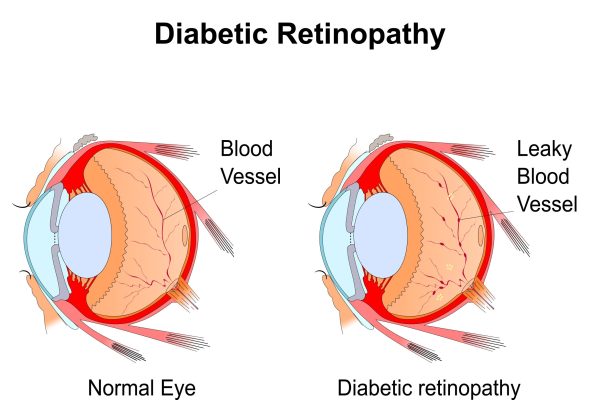Diabetic eye disease is a term for several eye problems that can all result from diabetes. Diabetic eye disease includes:
- Diabetic Retinopathy
- Diabetic Macular Edema
- Cataract
- Glaucoma

Diabetic eye disease is a term for several eye problems that can all result from diabetes. Diabetic eye disease includes:
Diabetic retinopathy is when blood vessels in the retina swell, leak, or close off completely. Abnormal new blood vessels can also grow on the surface of the retina.
People who have diabetes or poor blood sugar control are at risk for diabetic retinopathy. Risk also increases the longer someone has diabetes. One woman developed diabetic retinopathy after living with diabetes for 25 years.
Diabetic macular edema: Macular edema happens when fluid builds up on the retina and causes swelling and blurry vision. Diabetes can cause macular edema. Diabetic macular edema can lead to permanent vision loss.
Diabetes and cataracts: Excess blood sugar from diabetes can cause cataracts. You may need cataract surgery to remove lenses that are clouded by the effects of diabetes. Maintaining good control of your blood sugar helps prevent permanent clouding of the lens and surgery.
Diabetes and glaucoma: Glaucoma is a group of diseases that cause damage to your eye’s optic nerve. This damage leads to irreversible loss of vision. Having diabetes doubles your chance of getting glaucoma.
What Other Eye Problems Are Related to Diabetes?
Diabetes can cause vision problems even if you do not have a form of diabetic eye disease.
If your blood sugar levels change quickly, it can affect the shape of your eye’s lens, causing blurry vision. Your vision goes back to normal after your blood sugar stabilizes. Have your blood sugar controlled before getting your eyeglasses prescription checked. This ensures you receive the correct prescription.
Diabetes is a risk factor for several other eye diseases. They include:
Diabetes is a very serious condition. Type 1 diabetes, also known as juvenile diabetes, is a chronic condition where the pancreas produces little or no insulin. Type 2 diabetes occurs in adulthood, and it affects the way your body processes glucose. These conditions can affect many systems of the body, including the eyes, causing a condition known as diabetic retinopathy. There is no cure for this condition; however, it can be treated by our eye doctors at Advanced Eye Specialists in Oxnard and Reseda. We have gathered some of the questions that we run into regarding diabetic retinopathy.
Anyone with diabetes can develop diabetic retinopathy; however, some factors can increase your chance of developing the condition.
In the early stages, diabetic retinopathy shows no symptoms. As the condition progresses, you may begin to experience the following symptoms:
If your condition is mild, you may not need treatment. However, our eye doctors will want to monitor your condition closely. As the condition progresses, we will use one of a few treatments to slow the progression of the disease.
Photocoagulation: This is a laser treatment that can slow or stop blood and fluid from leaking into the eye.
Scatter laser treatment: This laser treatment can shrink abnormal blood vessels.
Vitrectomy: This is a surgical procedure where our ophthalmologist creates a tiny incision in your eye to remove blood from the vitreous. We will also remove any scar tissue that is tugging on the retina.
Injecting medication: Our ophthalmologist can inject medication directly into your eye that is designed to stop new blood vessels from forming.
Error: Contact form not found.

